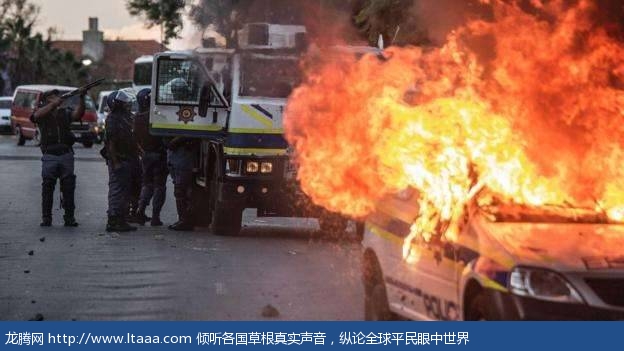【BBC】西方文明会怎样崩溃 [英国媒体]
瑞秋·努尔说,一些可能导致崩溃的因素已经就位,西方对此做出的回应将决定世界的未来。政治经济学家本杰明·弗里德曼曾把现代西方社会比喻成一辆运行稳定的、由经济增长推动车轮转动的自行车。如果这辆自行车减慢或者停止,我们社会的支柱——民主、个人自由、社会宽容以及其他更多方面——将会开始动摇......
How Western Civilization Could Collapse
西方文明会怎样崩溃
Some possible precipitating factors arealready in place. How the West reacts to them will determine the world’sfuture, says Rachel Nuwer.
瑞秋·努尔说,一些可能导致崩溃的因素已经就位,西方对此做出的回应将决定世界的未来。
By Rachel Nuwer
18 April 2017
作者:瑞秋·努尔
2017年4月18日
The political economist Benjamin Friedmanonce comparedmodern Western society to a stable bicycle whose wheels are kept spinning byeconomic growth. Should that forward-propelling motion slow or cease, thepillars that define our society – democracy, individual liberties, socialtolerance and more – would begin to teeter. Our world would become anincreasingly ugly place, one defined by a scramble over limited resources and arejection of anyone outside of our immediate group. Should we find no way toget the wheels back in motion, we’d eventually face total societal collapse.
政治经济学家本杰明·弗里德曼曾把现代西方社会比喻成一辆运行稳定的、由经济增长推动车轮转动的自行车。如果这辆自行车减慢或者停止,我们社会的支柱——民主、个人自由、社会宽容以及其他更多方面——将会开始动摇。我们的世界会越来越丑恶,充满对有限资源的争夺,并且拒绝任何人进入我们的小圈子。如果我们找不到能让车轮继续转动的方法,我们将会面临社会的全面崩溃。
Such collapses have occurred many times inhuman history, and no civilisation, no matter how seemingly great, is immune tothe vulnerabilities that may lead a society to its end. Regardless of how wellthings are going in the present moment, the situation can always change.Putting aside species-ending events like an asteroid strike, nuclear winter ordeadly pandemic, history tells us that it’s usually a plethora of factors thatcontribute to collapse. What are they, and which, if any, have already begun tosurface? It should come as no surprise that humanity is currently on anunsustainable and uncertain path – but just how close are we to reaching thepoint of no return?
这种崩溃在人类历史中多次发生,并没有哪个文明——不管它看起来多么伟大——能够对这一终将导致社会完结的灾难保持免疫。不管现在社会体系运行得多么良好,情况总会发生变化。排除种族灭绝事件——类似小行星撞击、核冬天或者致命的瘟疫,历史告诉我们总有超多的因素会导致社会崩溃。这些因素是什么,或者,哪些因素已经出现?毫无疑问,崩溃终将到来,因为人类社会正走上一条不稳定且不确定的道路——不过我们距离无法回头的地步还有多远?
A South African police van is set on firefollowing protests about inequality in 2016 (Credit: Getty Images)
在2016年的一次针对不平等的抗议中,一辆南非警车被点燃(版权:Getty图片)
While it’s impossible to predict the futurewith certainty, mathematics, science and history can provide hints about theprospects of Western societies for long-term continuation.
现在还无法准确地预测未来的走向,通过数学、科学和历史可以发现关于西方社会长期运行形势的一些暗示。
Safa Motesharrei, a systems scientist atthe University of Maryland, uses computer models to gain a deeper understandingof the mechanisms that can lead to local or global sustainability or collapse.According to findings thatMotesharrei and his colleagues published in 2014, there are two factors thatmatter: ecological strain and economic stratification. The ecological categoryis the more widely understood and recognised path to potential doom, especiallyin terms of depletion of natural resources such as groundwater, soil, fisheriesand forests – all of which could be worsened by climate change.
萨法·穆特沙雷,马里兰大学的一名系统科学家,他利用计算机模型加深了对于能够导致区域或全球的稳定或崩溃的机制的认识。根据穆特沙雷和他的同事们在2014年发表的一些发现,有两个因素最重要:生态紧张和经济分层。生态问题会导致潜在的灾难已获得广泛共识,尤其当自然资源——例如淡水、石油、渔业和森林——枯竭时。这些问题会因为气候变化而恶化。
That economic stratification may lead tocollapse on its own, on the other hand, came as more of a surprise toMotesharrei and his colleagues. Under this scenario, elites push society towardinstability and eventual collapse by hoarding huge quantities of wealth andresources, and leaving little or none for commoners who vastly outnumber themyet support them with labour. Eventually, the working population crashesbecause the portion of wealth allocated to them is not enough, followed bycollapse of the elites due to the absence of labour. The inequalities we seetoday both within and between countries already point to such disparities. Forexample, the top10% of global income earners are responsible for almost as much totalgreenhouse gas emissions as the bottom 90% combined. Similarly, about halfthe world’s population lives on less than $3 per day.
另一方面,经济分层问题自身即可导致社会崩溃,这大大出乎了穆特沙雷和他的同事们的意料。根据这一设想,精英阶层占有绝大多数财富和资源,而只把一点点——甚至一点都不留给依靠出卖劳动力支撑他们的享乐的更广大普通人阶层。这将导致社会变得不稳定,走向崩溃。最终,劳动阶层由于得不到足够的资源而毁灭,精英阶层也会因为缺少劳动力支持最终崩塌(译者忍不住吐槽:有没有搞错??资产阶级居然是因为无产阶级都饿死了而灭亡的??)。这种不公平的现象在今天已经在各国内部和各国之间出现。例如,全球10%最富裕的人要对超过90%的温室气体排放负责。同样的,世界有大概一半的人口每天生活费不到3美元。
For both scenarios, the models define acarrying capacity – a total population level that a given environment’sresources can sustain over the long term. If the carrying capacity is overshotby too much, collapse becomes inevitable. That fate is avoidable, however. “Ifwe make rational choices to reduce factors such as inequality, explosivepopulation growth, the rate at which we deplete natural resources and the rateof pollution – all perfectly doable things – then we can avoid collapse andstabilise onto a sustainable trajectory,” Motesharrei said. “But we cannot waitforever to make those decisions.”
计算机模型为两种设想分别确定了承载能力——给定环境资源在长周期内能供养的最大人口数量。如果超出承载能力太多,崩溃将无法避免。这是摆脱不掉的命运。“如果我们能够做出一些理性的选择,减少例如不公平、人口爆炸、我们消耗自然资源和我们污染环境的速度等等因素——这些都是可以做到的,我们就可以避免崩溃,走上一条稳定的、可持续的道路,”穆特沙雷说。“但是我们不能永远等待着这些决定被做出。”
One of the most important lessons fromRome’s fall is that complexity has a cost (Credit: Getty Images)
关于罗马毁灭的最重要一课就是:复杂性是有代价的(版权:Getty图片)
Unfortunately, some experts believe suchtough decisions exceed our political and psychological capabilities. “The worldwill not rise to the occasion of solving the climate problem during thiscentury, simply because it is more expensive in the short term to solve theproblem than it is to just keep acting as usual,” says Jorgen Randers, aprofessor emeritus of climate strategy at the BI Norwegian Business School, andauthor of 2052:A Global Forecast for the Next Forty Years. “The climate problem will getworse and worse and worse because we won’t be able to live up to what we’vepromised to do in the Paris Agreement and elsewhere.”
不幸的是,有些专家认为上述这些痛苦的决定已经超出了我们的政治和精神能力。“本世纪无法解决气候问题,因为短期来看花费过于高昂,不如就一切照常,”尤根·兰德斯,BI挪威商学院气候策略专业的荣誉退休教授,同时也是《2052:未来四十年的全球预测》一书的作者。“气候问题只会变得越来越严重,因为我们不能兑现我们在巴黎协议或者其他什么协议中所做的承诺。”
While we are all in this together, theworld’s poorest will feel the effects of collapse first. Indeed, some nationsare already serving as canaries in the coal mine for the issues that mayeventually pull apart more affluent ones. Syria, for example, enjoyedexceptionally high fertility rates for a time, which fueled rapid populationgrowth. A severe drought in the late 2000s, likely made worse by human-inducedclimate change, combined with groundwater shortages to cripple agriculturalproduction. That crisis left large numbers of people – especially young men –unemployed, discontent and desperate. Many flooded into urban centres,overwhelming limited resources and services there. Pre-existing ethnic tensionsincreased, creating fertile grounds for violence and conflict. On top of that,poor governance – including neoliberal policies that eliminated water subsidiesin the middle of the drought – tipped the country into civil war in 2011 andsent it careening toward collapse.
当我们都处在相同状况时,这个世界上最贫穷的人将会首先感受到崩溃。的确,一些国家已经像矿井里的金丝雀(译者注:金丝雀对瓦斯气体非常敏感)一样遭遇了这些问题,最终还会有更多更富裕的国家也分崩离析。例如,叙利亚,生育率曾经奇高,导致了人口暴增。21世纪头十年的一场严重干旱——似乎因为人为原因造成的气候改变而进一步恶化——加上淡水短缺,导致了农业歉收。这场危机导致了大量人口——尤其是青年——失业,不满和绝望。很多人涌向城市中心,争夺有限的资源和服务。早已存在的种族问题变得更加紧张,为暴力和冲突提供了土壤。最后,无能的政府管理——包括在干旱期间取消淡水补贴的新自由主义政策——在2011年引发了内战,把国家推入了崩溃的深渊。
In Syria’s case – as with so many othersocietal collapses throughout history – it was not one but a plethora offactors that contributed, says Thomas Homer-Dixon, chair of global systems atthe Balsillie School of International Affairs in Waterloo, Canada, and authorofTheUpside of Down. Homer-Dixon calls these combined forces tectonic stressesfor the way in which they quietly build up and then abruptly erupt, overloadingany stabilising mechanisms that otherwise keep a society in check.
托马斯·侯莫-迪克森认为,在叙利亚的例子中——和历史中其他社会崩溃的例子一样——不是由一个,而是非常多个因素共同导致了灾难的发生。托马斯·侯莫-迪克森是加拿大滑铁卢的巴尔西利国际关系学院全球系统的主席,也是《底朝天》一书的作者。侯莫-迪克森称这些因素为有毒的应力,因为它们暗中增长,突然爆发,让一切维持社会运转的稳定机制超负荷。
The Syrian case aside, another sign thatwe’re entering into a danger zone, Homer-Dixon says, is the increasingoccurrence of what experts call nonlinearities, or sudden, unexpected changesin the world’s order, such as the 2008 economic crisis, the rise of ISIS,Brexit, or Donald Trump’s election.
除了叙利亚的例子,侯莫-迪克森说还有一个信号显示我们正在进入危险区,那就是正在越来越多发生的——专家称它为非线性,或者说突然的、预料之外的世界秩序改变,例如2008年的经济危机、ISIS危机、英国脱欧,或者唐纳德·川普当选美国总统。
Some civilisations simply fade out ofexistence - becoming the stuff of history not with a bang but a whimper(Credit: iStock)
一些文明逐渐淡出——并没有轰轰烈烈的毁灭,而只是伴随着无声的呜咽(版权:iStock)
The past can also provide hints for how thefuture might play out. Take, for example, the rise and fall of the RomanEmpire. By the end of the 100BC the Romans had spread across the Mediterranean,to the places most easily accessed by sea. They should have stopped there, butthings were going well and they felt empowered to expand to new frontiers byland. While transportation by sea was economical, however, transportationacross land was slow and expensive. All the while, they were overextendingthemselves and running up costs. The Empire managed to remain stable in theensuing centuries, but repercussions for spreading themselves too thin caughtup with them in the 3rd Century, which was plagued by civil war and invasions.The Empire tried to maintain its core lands, even as the army ate up its budgetand inflation climbed ever higher as the government debased its silver currencyto try to cover its mounting expenses. While some scholars cite the beginningof collapse as the year 410, when the invading Visigoths sacked the capital,that dramatic event was made possible by a downward spiral spanning more than acentury.
历史还可以给我们提供一些关于未来如何走向灭亡的暗示。例如,拿罗马帝国的崛起和覆灭来说。在公元前100年年底,罗马人已将版图扩大至地中海对岸,统治了所有与海相接的地方。他们本可以就此收手,但是一切都进行得太顺利了,他们觉得可以把边界线向陆地深处推进。然而,海运是十分经济的,陆上运输却是缓慢而昂贵的。一直以来,他们都过度扩张,成本不断增高。在接下来的几个世纪里,罗马帝国努力保持稳定,但是在公元三世纪,过度扩张的报应来了,内战和入侵层出不穷。帝国试图保留它的核心区域,即使军队吃光了粮饷以及由于动用了作为国家根本的白银储备来支持其巨额支出导致通货膨胀率暴增到历史高点也在所不惜。虽然一些学者认为崩溃始于公元410年西哥特人攻陷帝国首都,这一戏剧性事件最终在形势回旋跌落了超过一个世纪后才变成现实。
According to Joseph Tainter, a professor ofenvironment and society at Utah State University and author of TheCollapse of Complex Societies, one of the most important lessons fromRome’s fall is that complexity hasa cost. As stated in the laws of thermodynamics, it takes energy to maintainany system in a complex, ordered state – and human society is no exception. Bythe 3rd Century, Rome was increasingly adding new things – an army double thesize, a cavalry, subdivided provinces that each needed their own bureaucracies,courts and defences – just to maintain its status quo and keep from slidingbackwards. Eventually, it could no longer afford to prop up those heightenedcomplexities. It was fiscal weakness, not war, that did the Empire in.
根据犹他州大学环境和社会系教授以及《复杂社会的崩溃》的作者乔瑟夫·特恩特尔的观点,罗马帝国覆灭的一个最主要原因是复杂性的代价。就如同热力学定律所描述的一样,在一个复杂且有序的国家维护任何系统都要消耗能量——人类社会概莫能外。在公元三世纪,罗马不断增加新事物——扩大了一倍的军队,一支骑兵部队,新划分出来的省份需要单独设立官僚体系、法院和防卫力量——只是为了保持现状防止倒退。最终,帝国再也支撑不起这过于复杂的体系。这是财政弱点,而不是因为帝国进入了战争状态。
So far, modern Western societies have largelybeen able to postpone similar precipitators of collapse through fossil fuelsand industrial technologies – think hydraulic fracturing coming along in 2008,just in time to offset soaring oil prices. Tainter suspects this will notalways be the case, however. “Imagine the costs if we have to build a seawallaround Manhattan, just to protect against storms and rising tides,” he says.Eventually, investment in complexity as a problem-solving strategy reaches apoint of diminishing returns, leading to fiscal weakness and vulnerability tocollapse. That is, he says “unless we find a way to pay for the complexity, asour ancestors did when they increasingly ran societies on fossil fuels.”
到目前为止,现代西方社会通过对化石燃料和工业科技的利用可以极大地推迟类似的衰败——想想在2008年,水力破碎技术恰好抵消了飙升的油价。然而,特恩特尔怀疑这并不会经常发生。“想象一下如果我们围着曼哈顿造一圈防波堤会花掉多少钱,这只是为了抵御风暴和潮汐,”他说。最终,将向复杂性投资作为解决问题的策略会到达一个恰好中和回报的临界点,最后导向财政衰弱和崩溃风险。就像他说的那样:“除非我们找到某种方法来为复杂性买单,类似我们的祖先在持续用化石燃料支撑社会运转时做的一样。”
A protest group in Argentina demonstratesagainst United States interference in the crises in Syria and Venezuela(Credit: Getty Images)
一个抗议组织在阿根廷示威反对美国干涉叙利亚和委内瑞拉的危机(版权:Getty图片)
Also paralleling Rome, Homer-Dixon predictsthat Western societies’ collapse will be preceded by a retraction of people andresources back to their core homelands. As poorer nations continue todisintegrate amid conflicts and natural disasters, enormous waves of migrantswill stream out of failing regions, seeking refuge in more stable states.Western societies will respond with restrictions and even bans on immigration;multi-billion dollar walls and border-patrolling drones and troops; heightenedsecurity on who and what gets in; and more authoritarian, populist styles ofgoverning. “It’s almost an immunological attempt by countries to sustain aperiphery and push pressure back,” Homer-Dixon says.
就像罗马一样,侯莫-迪克森预言西方社会的崩溃会以人们和资源退回到他们的核心区域开始。贫穷国家在冲突和自然灾害中持续解体,大量移民逃离沦陷区,涌入更加稳定的国家寻找避难所。西方社会将会以限制甚至禁止移民作为回应;花费数十亿美元建立围墙和边境巡逻无人机和军队;对进入国境的人或物实施高度戒备;最后是更加集权、民粹形式的统治。“国家几乎像是免疫反应一样保持自己的边界并将压力推回去,”侯莫-迪克森说。
Meanwhile, a widening gap between rich andpoor within those already vulnerable Western nations will push society towardfurther instability from the inside. “By 2050, the US and UK will have evolvedinto two-class societies where a small elite lives a good life and there is decliningwell-being for the majority,” Randers says. “What will collapse is equity.”
同时,已经十分脆弱的西方国家内部的贫富差距会进一步从内部损害社会稳定。“到2050年,美国和英国将会演变成两个阶级的社会,少数精英会过着舒服的日子,而绝大多数人的福利会减少,”兰德斯说。“这会使社会平等崩溃。”
Whether in the US, UK or elsewhere, themore dissatisfied and afraid people become, Homer-Dixon says, the more of atendency they have to cling to their in-group identity – whether religious,racial or national. Denial, including of the emerging prospect of societalcollapse itself, will be widespread, as will rejection of evidence-based fact.If people admit that problems exist at all, they will assign blame for thoseproblems to everyone outside of their in-group, building up resentment. “You’resetting up the psychological and social prerequisites for mass violence,” Homer-Dixonsays. When localised violence finally does break out, or another country orgroup decides to invade, collapse will be difficult to avoid.
侯莫-迪克森说,无论在美国、英国或是其他地方,人民越是感觉到不满和恐惧,就越会倾向于坚守自己的集团内部身份——无论是宗教信仰、种族或是国籍。否认——包括否认已经出现的社会崩溃前兆——将会大范围蔓延,就像也会拒绝基于证据的现实一样。如果人们承认问题已经存在,他们会把责任都怪罪到他们集团以外的人头上,仇恨由此建立起来。“你正在创造大规模暴力的心理和社会先决条件,”侯莫-迪克森说。当区域性暴力最终发生,或者其他国家或团体决定入侵,崩溃就很难避免了。
Europe, with its close proximity to Africa,its land bridge to the Middle East and its neighbourly status with morepolitically volatile nations to the East, will feel these pressures first. TheUS will likely hold out longer, surrounded as it is by ocean buffers.
欧洲,由于距离非洲很近,跟中东有大陆桥相连,东部邻国政治更加不稳定,导致它会首先感受到压力。美国由于有海洋作为缓冲区还会支持得更久一些。
A severe drought in Syria left many people– especially young men – unemployed, discontent and desperate, which may havebeen a factor that led to civil war (Credit Getty Images):
一场严重的干旱让叙利亚的许多人——尤其是年轻人——失业,不满和绝望,成为导致内战的因素之一(版权:Getty图片)
On the other hand, Western societies maynot meet with a violent, dramatic end. In some cases, civilisations simply fadeout of existence – becoming the stuff of history not with a bang but a whimper.The British Empire has been on this path since 1918, Randers says, and otherWestern nations might go this route as well. As time passes, they will becomeincreasingly inconsequential and, in response to the problems driving theirslow fade-out, will also starkly depart from the values they hold dear today.“Western nations are not going to collapse, but the smooth operation and friendlynature of Western society will disappear, because inequity is going toexplode,” Randers argues. “Democratic, liberal society will fail, whilestronger governments like China will be the winners.”
从另一个角度来说,西方社会不一定会走向一个充满暴力和戏剧性的终结。在一些案例里,文明只是逐渐淡出——并没有轰轰烈烈的毁灭,而是伴随着无声的呜咽成为历史的一部分。大英帝国从1918年开始走上这条道路,兰德斯说,其他西方国家可能也会走上相同的道路。随着时间的流逝,它们会逐渐变得微不足道,作为对驱使它们缓慢淡出的问题的回应,它们也会完全远离今天它们珍视的价值观。“西方国家不会走向崩溃,但是流畅的运行和友好的本性会消失,因为不平等问题会开始爆发,”兰德斯争辩说,“民主、自由社会将会失势,类似于中国政府那样的强力政府会最终获胜。”
Some of these forecasts and early warningsigns should sound familiar, precisely because they are already underway. WhileHomer-Dixon is not surprised at the world’s recent turn of events – hepredicted some of them in his 2006 book – he didn’t expect these developmentsto occur before the mid-2020s.
有些预测和早期预警信号听起来很熟悉,恰恰因为它们正在发生。当侯莫-迪克森对当前世界的转向毫不惊讶——他早在2006年的书里就预测了其中一些事件——时,他并没有想到这些事件会在2020年代中期之前发生。
Western civilisation is not a lost cause,however. Using reason and science to guide decisions, paired with extraordinaryleadership and exceptional goodwill, human society can progress to higher andhigher levels of well-being and development, Homer-Dixon says. Even as weweather the coming stresses of climate change, population growth and droppingenergy returns, we can maintain our societies and better them. But thatrequires resisting the very natural urge, when confronted with suchoverwhelming pressures, to become less cooperative, less generous and less opento reason. “The question is, how can we manage to preserve some kind of humaneworld as we make our way through these changes?” Homer-Dixon says.
但是,西方文明并不是造成失落的原因。侯莫-迪克森说,运用理性和科学来引导决定,加上出色的领导和特别的善意,人类社会可以向更高的等级前进,获得更多的幸福和发展。即使我们承受着气候变化、人口爆炸和能源减少带来的压力,我们仍可以维持我们的社会,并且改善它。但是这要求在面对如此不可抗拒的压力时抵抗自然的驱使,变得不那么配合,不那么慷慨,不那么拥抱理性。“问题在于,我们如何在想办法改变的同时保留某种有人性的世界?”侯莫-迪克森说。
版权声明
我们致力于传递世界各地老百姓最真实、最直接、最详尽的对中国的看法
【版权与免责声明】如发现内容存在版权问题,烦请提供相关信息发邮件,
我们将及时沟通与处理。本站内容除非来源注明五毛网,否则均为网友转载,涉及言论、版权与本站无关。
本文仅代表作者观点,不代表本站立场。
本文来自网络,如有侵权及时联系本网站。
图文文章RECOMMEND
热门文章HOT NEWS
-
1
最近,新冠肺炎疫情在日本有扩大的趋势,有专家呼吁日本应当举国行动起来,共...
- 2
- 3
- 4
- 5
- 6
- 7
- 8
- 9
- 10
推荐文章HOT NEWS
-
1
最近,新冠肺炎疫情在日本有扩大的趋势,有专家呼吁日本应当举国行动起来,共...
- 2
- 3
- 4
- 5
- 6
- 7
- 8
- 9
- 10















